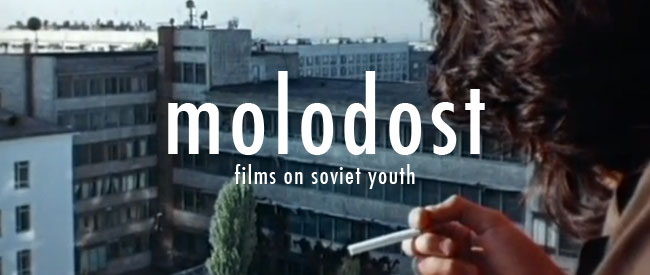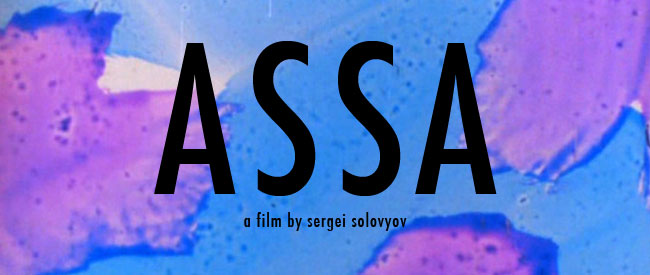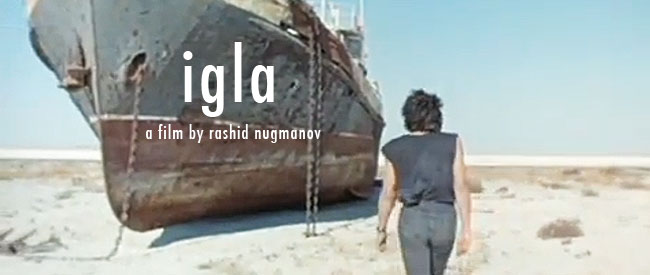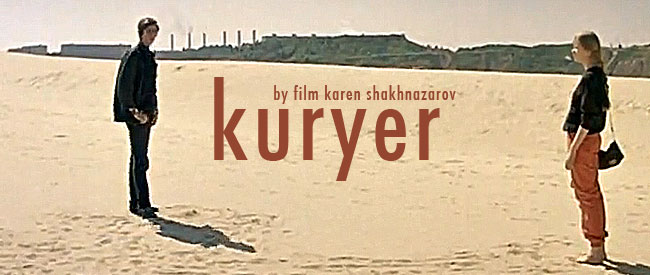
Molodost: Films on Soviet Youth
“What do you want from life? What do you want from life?” “I just want to contribute to society.” A prominent subject of late-perestroika cinema was the molodezh or the ‘youth’ generation. Similar to current discourse surrounding the “millennial” generation, Soviet youth were often portrayed as either a symbol for hope and reformation, or as lost and apathetic. Disenchantment with old Soviet ideologies led to a questioning of authority, both in the political arena and the home. As the Soviet Union’s cultural symbols lost power, Gorbachev’s implementation of glasnost in the late ’80s simultaneously opened up a floodgate of western music, fashion, and movies, widening the communication gap between youth and authority. The new cultural influences led to various forms of agitation and rebellion: rock music, drugs, and civil disobedience. At the same time, however, it fostered inaction, indifference, and apathy. While perestroika-era films explored a new openness in social and civil critique, they were also overwhelmingly pessimistic and cynical. Paradoxically, and despite such portrayals, Soviet Union’s mainstream culture publicly accepted its youth subculture, and turned it into a symbol, if not an actual catalyst, for radical change. Molodost—meaning the time of youth— explores three different coming of age stories taking place on the cusp of the perestroika era, before the ultimate disillusionment of the Soviet Union. Assa, credited with bringing underground rock music into the mainstream, follows an underground rocker and his relationship with a girl, her Mafioso lover, and the police. Igla often described as a precursor for late Soviet/Kazakh new wave, and also featuring underground rock stars, is a surreal, postmodern cacophony of social collapse and drug use. Lastly, and perhaps the most sobering of the three, Kuryer tells the story of a high school graduate trying to make sense of his life. With no prospect for a college education, a grim mandatory military service awaits in his future.
 ASSA
ASSA
Dir: Sergei Solovyov, 1987
Soviet Union, 153 min.
Russian with English subtitles
THURSDAY, SEPTEMBER 5 – 8:00 PM
FRIDAY, SEPTEMBER 20 – 8:00 PM
TUESDAY, SEPTEMBER 24 – 10:00 PM
Assa came to recognition and cult status as one of the first films to bring underground rock culture into the Soviet mainstream, featuring songs by bands such as Aquarium, Soyuz Kompozitorov, Bravo, and Kino (whose lead singer Viktor Tsoi, also featured in Igla, plays himself in the film). Assa reflected a time of change in the USSR, as emphasized in Tsoi’s song “We Wait for Change,” consequently adopted by the real-life Russian opposition movement Solidarnost as its anthem. Set in Crimea during the late 1980s, Assa follows the story of Alika, a young nurse who is romantically involved with Krymov, her much older patient and the leader of an organized crime group. Despite her relationship with Krymov, Alika starts falling for a young rock musician named Bananan (played by the avant-garde artist Afrika). Bananan introduces Alika to his countercultural world of music and art. When the jealous Krymov begins to notice a change in Alika’s emotions toward him, he stages a plan to eliminate Bananan from Alika’s life forever. Assa has a playful, absurdist touch, combining sober moments with dreamlike sequences. Experimental scenes of hand-painted abstract patterns and inter-titles explaining youth slang are interspersed throughout the film. One amusing subplot that develops follows Krymov reading a book of the assassination attempt on Russia’s Tsar Paul I—the “Mad Tsar”. As he reads, a fantasy reenactment plays parallel to the main story. Perhaps this text foreshadows the inevitable fate of the Union: according to the assassins, they were only abolishing a power from Russia that had gone mad.
 IGLA (aka The Needle)
IGLA (aka The Needle)
Dir: Rashid Nugmanov, 1988
Soviet Union, 81 min.
Russian with English subtitles
FRIDAY, SEPTEMBER 13 – 10:00 PM
SATURDAY, SEPTEMBER 21 – 7:30 PM
SUNDAY, SEPTEMBER 29 – 7:30 PM
Igla is a disjointed, narratively unconventional film, and a precursor to the Kazakh new wave. Its beautifully austere and surreal scenes are set in the collapsing, virtually lawless Soviet Union. While Igla touches upon taboos and political subjects such as drug use and organized crime—two of perestroika’s biggest social afflictions—Rashid Nugmanov, Igla’s young Kazakh director, described the film as just a fun project made by a few friends, and more of an homage to “Soviet television” than a social critique. Viktor Tsoi, (Kino’s front man) plays Moro, a stoic and nonchalant young man. Moro travels to Almaty to collect an unpaid debt, getting into trouble with a local gang on the way. Eventually, he finds himself helping Dina, his morphine-addicted ex-girlfriend, and rescuing her from a drug ring led by an insidious doctor (played by Peter Mamonov, front man of the band Zvuki Mu). In an attempt to get Dina clean, Moro takes her to the dry Aral Sea in the Kazakh desert, where she suffers through withdrawal. When they return, however, Dina relapses and Moro confronts the doctor. In the end, Dina’s fate remains ambiguous, as does the direction of Moro’s own future. Igla launched Viktor Tsoi into the mainstream, and many of his songs used in the film became huge hits. His own untimely death in 1990 marked him as a cult icon and symbol for freedom and romance during the end times of the USSR.
 KURYER (Courier)
KURYER (Courier)
Dir: Karen Shakhazarov, 1987
Soviet Union, 88 min.
Russian with English subtitles
TUESDAY, SEPTEMBER 3 – 7:30 PM
MONDAY, SEPTEMBER 9 – 7:30 PM
SUNDAY, SEPTEMBER 22 – 7:30 PM
Largely ignored on release, Kuryer eventually came to critical acclaim over the years. Stylistically and narratively more straightforward than the other films in this series, Kuryer explores the frustration of being young and at a crossroads in life—especially if the roads lead to nowhere. It follows Ivan Miroshinokov, a clever young magazine courier struggling to find himself after his parent’s divorce and his rejection from University. Ivan’s admiration for his father begins to wane after he leaves his mother for a younger woman and goes off to Africa to pursue his dreams. Ivan is left to live with his mother, who has a difficult time dealing with the divorce. Through one of his deliveries, Ivan meets Katya, the daughter of an authoritarian professor. Ivan is forced to confront the expectations of Katya’s father and measure up to her elite group of friends, leading him to entirely re-evaluate his prospects in life. Grappling between unattainable dreams and a bleak reality, Ivan’s choices echo the rebellious lost generation, plagued by both their parents’ and their own disappointments with the collapsing Soviet existence.
